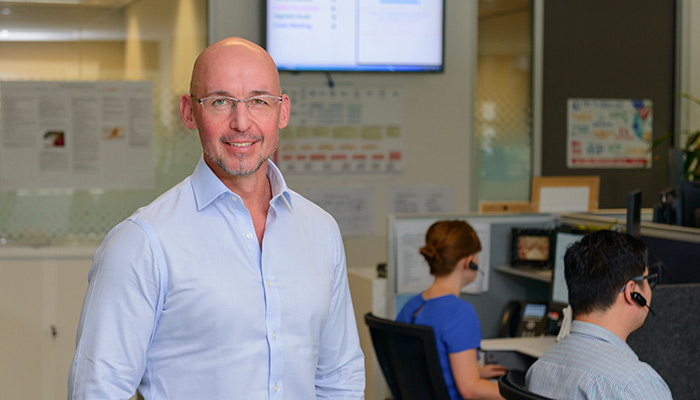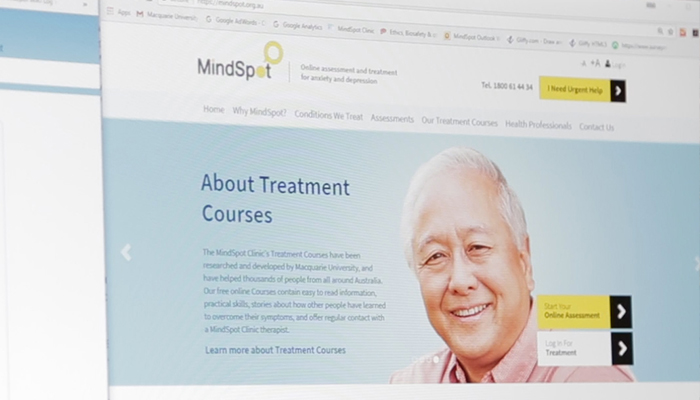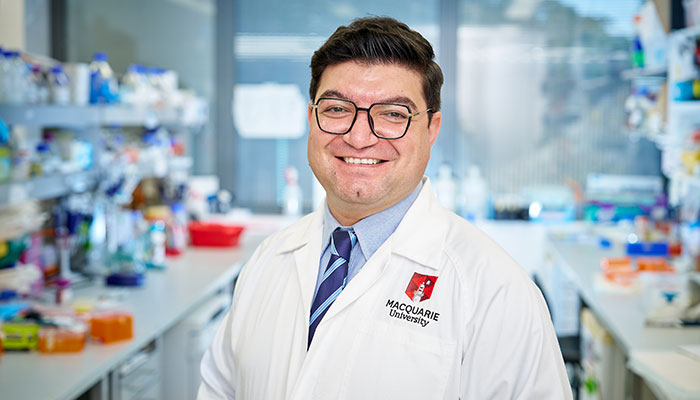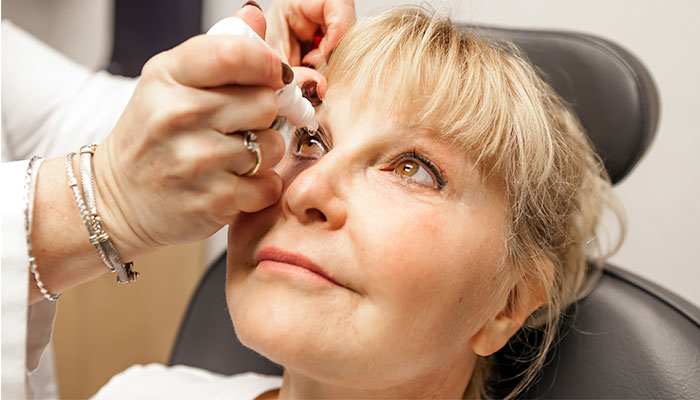More than 125,000 people around Australia have accessed anxiety and depression assessment services since the launch of Macquarie’s digital mental health portal, the MindSpot Clinic.

Practical support: MindSpot Director Professor Nick Titov, says many clients have never sought therapy before contacting them.
The clinic now also delivers interventions to help people with chronic pain manage their disability and distress.
“MindSpot prioritises services and interventions that can help the largest number of people,” says Professor Nick Titov, who is Director of MindSpot and co-Director of Macquarie’s eCentreClinic.
“Many of the people who use our service haven't had treatment before, and many report that they're not going to seek treatment elsewhere, for a range of reasons, including stigma and concerns about privacy.”
Titov is a clinical psychologist who led the development of the innovative service and now heads up a team of more than 50 people who provide assessment and treatment for adults with anxiety, depression and chronic pain.
“People often think about going to the psychologist or psychiatrist as a deeply emotional and traumatic experience, which invariably involves recounting your deepest, darkest fears," explains Titov.
Some of the people we work with have such severe symptoms that they aren't able to see a professional face-to-face
But the MindSpot team have taken the approach of finding ways to help people who have anxiety and depression to manage their symptoms, without dwelling on the past.
“These symptoms are obviously incredibly distressing and disabling, but we know people can learn to manage them, and we teach people practical skills that they can use to deal with them.”
Convenience a drawcard
Many people struggle to take time off during business hours to go and visit a therapist, making the convenience and accessibility of online services a big drawcard.
“People can access our service 24/7; therapists are available until 8pm most nights, and once they’ve registered with us they can access the resources and information," Titov says.
Internet-delivered services can also complement therapies offered face-to-face.
“Some of the people we work with have such severe symptoms that they aren't able to see a professional face-to-face,” he explains.

Self help: The MindSpot Clinic equips people with practical psychological skills so they can learn how to manage their own symptoms.
People with severe anxiety or social phobia can find it overwhelming to leave their home. “Working with us can help them build enough confidence and skills to then be able to see somebody face-to-face for further support and treatment.”
MindSpot is a great example of stepped care. “People can use our service and then step up to more intensive face-to-face treatment; but they can also step down to our service – so, after an in-patient admission, or after working with their therapist or psychiatrist face-to-face, we can provide them with some additional support afterwards,” Titov says.
Many people come to MindSpot for assessment and information rather than treatment.
“We support people to learn practical psychological skills that can help them manage their own symptoms in the long term. We found that most of the people we work with actually just want to talk to somebody, and want to learn about their symptoms.”
- Young women most likely to have poor mental health
- Why you should take a guilt-free mental health day
Getting an assessment and information gives people agency, and the service can be accessed quickly and easily, he says – and MindSpot also helps people make informed decisions about what they can do next.
“Some people go on to treatment with us, others decide to manage their symptoms themselves, while we help others learn about and then access other services.”
In comparison, face-to-face appointments with a psychologist or a psychiatrist generally only happen after a GP referral, and the process often takes a few weeks to arrange because GPs and mental health professionals often have substantial waiting lists.
All age treatment
Despite a perception that young people are the main adopters of online solutions, the average age of MindSpot clients, surprisingly, is around 36 years – which mirrors the average age of clients who see a psychologist or a psychiatrist face-to-face.
“That’s a concern because we know the average age of onset of symptoms of anxiety and depression is in late childhood or early adulthood, so it seems people still wait for at least a decade before they seek support or treatment,” says Titov.
Around 400,000 people a year visit the MindSpot website and many complete the site’s anonymous online quizzes, which ask about symptoms of anxiety and depression and give high level recommendations.
Sometimes older clients will tell us, ‘I've had these symptoms for decades... I want to get rid of the symptoms so I can enjoy what time I have left
Each year, around 20,000 of these then choose to complete an online or a telephone based assessment. Many go on to discuss treatment options with MindSpot staff and perhaps access their clinical services.
“The people most likely to want to talk to us during treatment by telephone calls on a weekly basis are male and likely to be older males – and that’s a group who often don’t want to engage in psychological treatment,” Titov says.
He thinks part of the reason is convenience; part of it, a sense of stigma. “Engagement rates are really high because so many of them find it easier to get help online or by phone rather than seeing someone face-to-face.”

Website wellbeing: MindSpot offers a range of treatment courses online.
He sees another positive product of online therapies – helping older people improve their lives.
As people age, he says, they become more resilient and confident - and often make a decision to learn to manage symptoms they have sometimes had since they were teenagers.
“Sometimes older clients will tell us, ‘I've had these symptoms for decades, and now I'm in my 60s or 70s or even 80s, I want to get rid of the symptoms so I can enjoy what time I have left."
Translational research
Some 125,000 Australians have done an assessment and 20,000 have accessed treatment through MindSpot since the service began in 2013.
MindSpot uses efficient workflows to deliver its high service levels. “It's a very high volume clinical service and we’ve learned to manage the flows and the demand,” he says.
Titov says that the clinic also focuses on translational research: “What we do in our research laboratory is often informed by knowing about service gaps in the community.”
The eCentreClinic research laboratory, led by Dr Blake Dear and located in the Department of Psychology at Macquarie University, has conducted more than 65 different clinical trials with more than 7,000 Australians.
One example is the new intervention that the eCentreClinic has developed for people who have chronic pain. “We know there are very few expert services available for people with chronic pain, despite one in five of the population often struggling with moderate or severe symptoms of chronic pain,” he says.
The intervention research has been trialled by Dr Dear, who has now completed four randomised controlled trials with about 1,500 people.
MindSpot now offers a fully-tested treatment course that helps people who have chronic pain manage the psychological distress and disability. Titov says that he hopes that in the future, MindSpot will be able to offer treatment courses that target a broader range of mental health concerns and problems.
*Data in this article was updated on March 30, 2020.
Professor Nick Titov is Director, Department of Psychology and Macquarie University's online mental health portal Mindspot Clinic.



